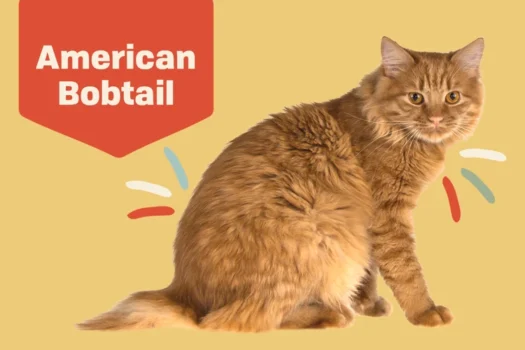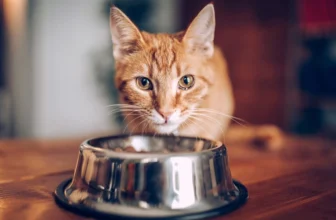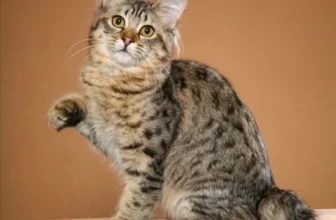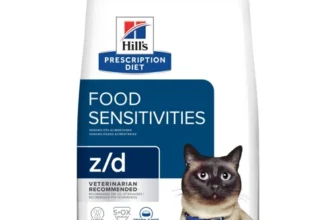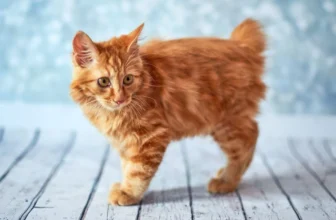As a cat owner, finding the perfect treats for your feline friend can be overwhelming. With so many options available, it can be challenging to determine which treats are the best for your American Bobtail cat. You want to ensure that the treats you’re giving them are both nutritious and delicious. In this article, we’ll provide you with a comprehensive guide on what treats are suitable for American Bobtail cats and how often you should give them. From high-protein treats to grain-free options, we’ll cover it all. So, let’s dive in and find the perfect treats for your furry friend!
What are the Best Treats for American Bobtail Cats?
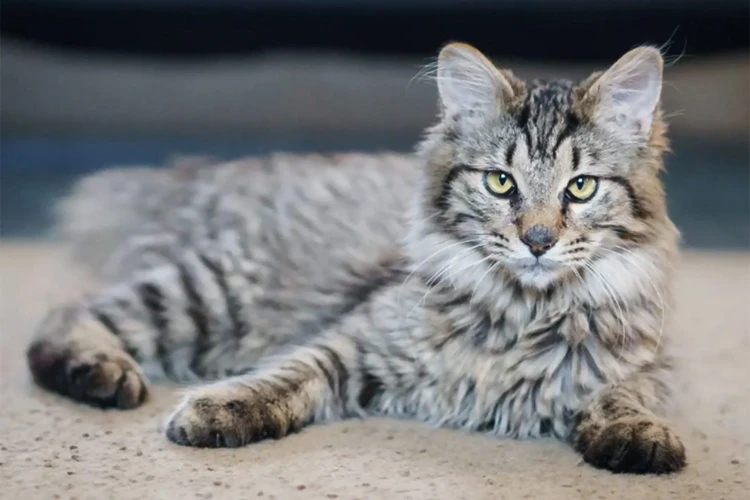
As a cat lover, you want to give your American Bobtail the best possible care. While a balanced diet is crucial, a tasty and healthy treat can provide important nutrition and excellent reinforcement during training. However, with so many options on the market, it can be perplexing to know what to choose. Additionally, not all treats are suitable for every cat, so it’s important to consider your cat’s dietary needs and preferences. In this section, we’ll explore the best choices for treats for American Bobtail cats, including specialty cat treats, homemade options, and high-protein and grain-free options. For more information on American Bobtail dietary needs, check out our comprehensive guide.
Specialty Cat Treats
Specialty cat treats are commercially produced treats that are designed specifically for cats. These treats are often made with high-quality ingredients, and they come in a variety of flavors that cats find irresistible.
Benefits of Specialty Cat Treats:
There are several benefits to giving your American Bobtail cat specialty treats. Specialty treats:
- Help improve dental health
- Have higher nutritional content
- Can help manage weight
- Are often made with high-quality ingredients
When choosing specialty cat treats, it’s important to read the ingredient list and choose treats that are low in calories and are specifically formulated for cats. Some of the best specialty cat treats include:
| Treats | Ingredient Benefits |
|---|---|
| Greenies Dental Treats | Helps improve dental health, reduces tartar buildup, freshens breath |
| Blue Buffalo Kitty Cravings | High-protein, no poultry by-product meals, no corn, wheat, or soy, no artificial preservatives, colors, or flavors |
| Hill’s Science Diet Crunchy Chicken Treats | Low-calorie, high-fiber, helps support digestive health, made with natural ingredients |
| Purina Pro Plan True Nature Natural Chicken & Rice Recipe | No artificial colors, flavors, or preservatives, high-protein, low-calorie, helps maintain a healthy weight |
Incorporating specialty cat treats into your American Bobtail cat’s diet can be a great way to provide them with extra nutrients and help keep them healthy. However, it’s important to keep in mind that treats should only make up a small portion of your cat’s overall diet. Too many treats can lead to obesity and other health problems.
To learn more about the importance of portion control for American Bobtail cats, check out our article on importance of portion control for American Bobtail cats. To learn more about feeding your American Bobtail cat, check out our other articles on food for American Bobtail cats, top 5 cat food brands for American Bobtails, feeding your American Bobtail cat free vs timed, feeding Bobtail kittens, best homemade cat food recipes for American Bobtail, and foods to avoid feeding your American Bobtail cat.
High-Protein Treats
Cats are obligate carnivores, which means that their bodies require a diet high in protein to thrive. High-protein treats are a great way to supplement your American Bobtail cat’s diet and provide them with essential nutrients. Here are some options for high-protein treats:
- Freeze-Dried Meat: Freeze-drying preserves the nutritional content of the meat while removing the moisture. This results in a high-protein, low-fat treat that your American Bobtail cat will love. You can find freeze-dried chicken, turkey, beef, and even fish at most pet stores.
- Canned Tuna or Salmon: Canned fish is another high-protein option for treats. Make sure it’s packed in water, not oil. Too much oil can cause weight gain and digestive problems. Limit your cat’s intake of canned fish because it can also be high in mercury.
- Baked Chicken: You can bake your own chicken as a high-protein treat. Be sure to remove all bones and skin, and cut the meat into small, bite-sized pieces before giving it to your American Bobtail cat.
- Boiled Eggs: Eggs are a great source of protein and other essential nutrients. Boil an egg, chop it up, and give it to your cat as a treat. Just remember to avoid giving them raw eggs because of the risk of salmonella.
Remember to incorporate high-protein treats into your American Bobtail cat’s diet in moderation. While protein is important for their overall health, too much of a good thing can be harmful. As with any treats, make sure to read the ingredients and choose high-quality options that don’t contain fillers or additives.
Grain-Free Treats
Grain-free treats have become increasingly popular in recent years for American Bobtail cats due to health concerns related to grain-based diets. These treats are made from ingredients such as meat, fish, vegetables, and fruits, which are all great sources of natural nutrients for cats. Some of the best grain-free treats for American Bobtail cats include:
- Fish-based treats: American Bobtail cats love fish, and salmon or tuna-based treats are a fantastic option for providing an extra source of protein and omega-3 fatty acids. Fish-based treats can also improve their immune system and eye health.
- Chicken or Turkey-based treats: Chicken and turkey-based treats are high in protein and are a great choice for American Bobtail cats that need extra protein in their diets. These treats can be baked or freeze-dried, and they come in a variety of flavors that your cat will love.
- Vegetable-based treats: Unlike humans, cats are obligate carnivores, but they can still benefit from eating some vegetables. Vegetable-based treats like sweet potato, pumpkin, and spinach are a great source of fiber and other nutrients for your cat. Just make sure that the vegetable is safe for cats to consume, as some can be toxic.
- Fruit-based treats: Many fruits can be a great source of vitamins and minerals for American Bobtail cats. However, it’s important to give them in moderation due to their high sugar content. Safe fruits for cats include apples, bananas, and blueberries, among others.
When selecting grain-free treats for your American Bobtail cat, be sure to check the label for any potentially harmful ingredients. Avoid treats that contain artificial preservatives, colors, flavors, corn, wheat, soy, or any other ingredients that may be harmful to cats. Additionally, due to the high protein content in grain-free treats, it’s crucial to stick to moderate serving sizes to avoid overfeeding your cat. As with any dietary change, it’s essential to introduce new treats slowly to see how your cat’s body responds.
Homemade Treats
Making homemade treats for your American Bobtail cat is not only a thoughtful gesture, but it also ensures that your furry friend is eating treats filled with healthy ingredients. Here are some ideas for homemade treats that are sure to please even the pickiest of eaters:
- Mashed Tuna and Catnip Treats: Mix a can of tuna with a tablespoon of dried catnip and one egg. Mash everything together and form small balls. Place them on a baking sheet and flatten them slightly. Bake them in the oven at 350 degrees Fahrenheit for 10-12 minutes.
- Chicken and Sweet Potato Treats: Cook chicken and sweet potatoes and mash them together. Form small balls and place them on a baking sheet. Bake them in the oven at 350 degrees Fahrenheit for 15-20 minutes.
- Sardine Popsicle Treats: Mix 1 tablespoon mashed sardines and 1/4 cup water. Pour the mixture into ice cube trays and freeze for a few hours. Pop one or two out at treat time for your cat to enjoy.
- Salmon and Oatmeal Balls: Cook salmon and oatmeal and mix them together with a tablespoon of catnip. Form small balls and bake them in the oven at 350 degrees Fahrenheit for 8-10 minutes.
Be sure to store any homemade treats in an airtight container in the fridge for up to a week. By making your own treats, you can also control the portion size and ingredients, ensuring that your cat is getting the best possible nutrition.
How Often Can You Give American Bobtail Cats Treats?
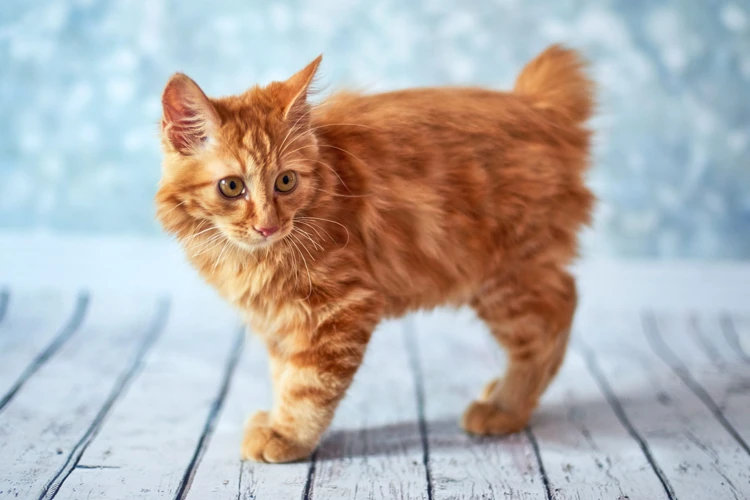
As a cat owner, you want to ensure your American Bobtail cat is happy and healthy. Treating your furry friend every now and then is a great way to show them love and affection. However, too many treats can lead to health issues like obesity and digestive problems. So, how frequently should you give your cat treats? Let’s dive into the factors that determine treat frequency and find the optimal amount of treats to give your American Bobtail cat.
Your Cat’s Age and Health
Age and health are two important considerations when deciding how often to give treats to your American Bobtail cat. Younger cats require more food and calories for growth and development, whereas senior cats have slower metabolism and may not need as many treats. Likewise, cats with pre-existing health conditions may require a different diet and treat schedule than healthy cats.
To help you better understand how often you can give treats to your American Bobtail cat based on age and health, we’ve put together the following table:
| Cat’s Age | Treat Frequency and Portion Size | Special Considerations |
|---|---|---|
| Kittens (Less than 1 year old) | 1-2 treats per day Small portions of high-protein treats or specialty kitten treats |
Kittens require more calories for growth and development, but treat portions should be small to avoid overfeeding |
| Adults (1-7 years old) | 2-4 treats per day Moderate portions of high-protein treats, grain-free treats, or specialty treats |
Adult cats have a stabilized metabolism, so treats should be given in moderation to avoid obesity |
| Seniors (7 years and older) | 1-2 treats per day Smaller portions of high-protein, grain-free, or specialty senior cat treats |
Senior cats often have slower metabolism and may need fewer treats to maintain a healthy weight |
| Cats with Health Conditions (Varies based on condition) | As recommended by a veterinarian, based on the cat’s individual needs and condition | Cats with health conditions may require a different diet and treat schedule than healthy cats. Your veterinarian can provide tailored advice on feeding and treat frequency for your cat’s specific needs. |
It’s important to note that the above table is a general guideline, and treat frequency should also be based on your cat’s individual nutritional needs and activity levels. Consulting with your veterinarian can help ensure your American Bobtail cat is receiving the appropriate amount of treats for their age, health, and lifestyle. Overfeeding your cat with treats can lead to obesity, oral health issues, and other health problems, so it’s always best to properly monitor and manage treat intake.
The Nutritional Value of the Treat
When it comes to deciding how often to give treats to your American Bobtail cat, it is important to consider the nutritional value of the treat. This is crucial in ensuring your cat maintains a balanced diet while still enjoying the occasional treat.
Different treats have varying nutritional values, and it is essential to understand what you are feeding your cat. To give you an idea of some of the nutritional values of various cat treats, we’ve compiled the following table:
| Treat Type | Calories per Serving (1 oz) | Protein Content | Fat Content | Fiber Content |
|---|---|---|---|---|
| Dry Food | ~100 | 20-35% | 10-15% | 1-5% |
| Canned Food | ~25-50 | 5-10% | 5-10% | 1-5% |
| Tuna (in Water) | 93 | 22% | 1% | 0% |
| Salmon (Canned) | 49 | 6% | 2% | 0% |
| Chicken Breast (Cooked) | 46 | 75% | 3% | 0% |
| Tuna Jerky | 70 | 85% | 5% | 1% |
As you can see from the table, different types of treats have varying calorie counts and nutritional benefits. Dry and canned foods generally have a higher calorie count and nutrient content than meat-based treats like canned salmon and tuna or cooked chicken breast. However, meat-based treats often have a higher protein content and fewer carbohydrates, making them healthier options for your American Bobtail cat.
It is important to read the labels of any treats you give your cat and monitor their daily caloric intake. Overfeeding treats with low nutritional value can lead to weight gain and other health problems, while underfeeding treats can deprive your cat of the occasional reward they deserve. Striking a balance between treat frequency and nutritional value is essential for maintaining your cat’s overall health and well-being.
The Frequency of Treat-Based Reinforcement
When it comes to giving treats to your American Bobtail cat, it’s important to keep the frequency of treat-based reinforcement in mind. Treats should be used as a reward for good behavior, and not as a regular part of their diet. Here’s a table to help you determine the appropriate frequency of treat-based reinforcement for your American Bobtail cat based on their age and activity level:
Age and Activity Level | Frequency of Treat-Based Reinforcement
———————–|————————————-
Kitten (up to 6 months) | 1-2 times per day
Adult (7 months to 7 years) – Low Activity Level | 1-2 times per week
Adult (7 months to 7 years) – Moderate to High Activity Level | 2-3 times per week
Senior (8+ years) – Low Activity Level | 1-2 times per week
Senior (8+ years) – Moderate to High Activity Level | 2-3 times per week
Note: Remember that treats should not make up more than 10% of your cat’s daily caloric intake. So, if you give your cat treats, make sure to adjust their regular meals accordingly to avoid overfeeding. Also, be aware that overfeeding treats can lead to weight gain and other health issues, so it’s essential to monitor the frequency and quantity of treats you give your American Bobtail cat.
What Are the Risks of Overfeeding My American Bobtail Cat Treats?
As much as we love to spoil our American Bobtail cats with treats, overindulging them can lead to several risks and health problems. It’s essential to understand the risks associated with overfeeding your feline friend to help you make healthier and safer treat choices. Read on to learn about the potential risks of overfeeding your American Bobtail cat, so you can keep them healthy and happy for years to come.
Obesity and Weight Management Issues
Obesity and weight management issues are a major concern for American Bobtail cat owners. Treats are an important part of their diet and can contribute to weight gain if given in excess. In fact, according to a study by the Association for Pet Obesity Prevention, up to 60% of cats in the U.S. are overweight or obese.
Causes of Obesity in American Bobtail Cats
There are a number of factors that can contribute to obesity in cats, including lack of exercise, overfeeding, and eating high-calorie treats. American Bobtail cats are an active breed and require regular exercise to maintain a healthy weight. If they are not given enough opportunities to exercise, they may become overweight.
Overfeeding is another common cause of obesity in cats. Owners may give their cats too much food, or too many treats, which can lead to weight gain. High-calorie treats can also contribute to obesity, as they are often loaded with sugar and fat.
Health Risks of Obesity in American Bobtail Cats
Obesity can lead to a number of health problems in American Bobtail cats. It can put excess strain on their joints, leading to arthritis, and can also cause heart and respiratory problems. Obesity can also increase the risk of diabetes, and can make it more difficult to manage existing health problems.
Weight Management Strategies for American Bobtail Cats
If your American Bobtail cat is overweight or obese, there are several weight management strategies you can implement. First, make sure you are feeding them a balanced and nutritious diet. Choose foods that are low in calories but high in protein, and avoid treats that are high in fat and sugar.
Next, increase your cat’s exercise routine. Play with them for at least 15-20 minutes each day, and provide them with opportunities to exercise throughout the day, such as climbing structures or scratching posts.
Finally, limit the amount of treats you give your cat. Use treats as a reward for good behavior, and choose low-calorie options, such as freeze-dried meat treats or bite-sized pieces of fresh, cooked chicken or fish.
| Causes of Obesity in American Bobtail Cats | Health Risks of Obesity in American Bobtail Cats | Weight Management Strategies for American Bobtail Cats |
|---|---|---|
| – Lack of exercise – Overfeeding – High-calorie treats |
– Arthritis – Heart and respiratory problems – Increased risk of diabetes – Difficulty managing existing health problems |
– Balanced and nutritious diet – More exercise – Limited treats – Low-calorie treat options |
Oral Health Issues
American Bobtail cats, like all felines, are prone to oral health issues. The buildup of plaque and tartar on teeth can cause significant dental problems, including gum disease, tooth decay, and tooth loss. It is important to monitor and maintain your American Bobtail’s oral hygiene to prevent these problems.
Regular dental check-ups: It is essential to take your American Bobtail to the veterinarian regularly for dental check-ups. The veterinarian can offer professional teeth cleaning, as well as identify and treat any dental issues before they become more severe.
Dental treats: Dental treats are specifically designed to help remove plaque and tartar buildup on a cat’s teeth. Many of these treats are also high in nutrients, making them a tasty and healthy option for your American Bobtail. Look for dental treats that have the Veterinary Oral Health Council (VOHC) seal of approval.
Brushing teeth: Yes, you can indeed brush your American Bobtail’s teeth! Using a soft-bristled toothbrush and feline-safe toothpaste, you can gently brush your cat’s teeth to prevent plaque buildup. Make sure to use a toothpaste that is specifically designed for cats, as human toothpaste can be harmful to cats.
Water additives: Water additives are an excellent way to promote dental health for American Bobtail cats. These products are added to your cat’s water bowl and help to break down plaque and tartar buildup. It is important to read the label carefully and choose products that are safe for cats.
Chew toys: Chew toys are a great way to promote dental health and help your American Bobtail’s teeth stay healthy. These toys help to remove plaque and tartar buildup, as well as provide mental stimulation and exercise for your cat. Look for chew toys that are specifically designed for cats and are made from safe materials.
By taking steps to maintain your American Bobtail’s oral health, you can significantly reduce the risk of dental problems and keep your cat’s teeth healthy and strong. Be sure to consult with your veterinarian for specific recommendations on the best products and practices for your furry friend.
Finicky Eating Habits
Cats, including American Bobtails, can develop finicky eating habits, which makes it challenging to get them to eat treats consistently. If your cat is ignoring their treats, it may be due to the ingredients or textures. Some cats prefer crunchy treats, while others prefer soft, chewy ones. Others might prefer fish-based treats over meat-based ones. To stimulate their taste buds, try offering different types of treats until you find one that your cat loves.
Cats can become bored with their treats over time, which can lead to them rejecting them entirely. You can combat this by switching up the types of treats you offer regularly or rotating between a few favorites.
If you’ve tried different types of treats and your cat still refuses to eat them, it’s crucial to find out why. There might be an underlying health issue or dental problem that is causing your cat’s reluctance to eat treats. Consult with your veterinarian to identify the issue, and they can guide you on the best course of action.
Factors that Affect Your Cat’s Appetite for Treats:
- The time of day (some cats prefer treats in the morning or evening)
- Stress levels
- Medication or supplements your cat may be taking
- Their feeding schedule (if they’re full from their meals, they may not want treats)
If your American Bobtail cat has finicky eating habits, it’s essential to be patient and experiment with different types of treats regularly. Additionally, it’s crucial to monitor your cat’s health to ensure that there are no underlying issues that are preventing them from enjoying their treats. If you have any concerns, consult with your veterinarian for guidance.
Digestive Problems
Digestive problems are a serious concern when it comes to American Bobtail cats and overfeeding them with treats. Giving them too many treats can lead to issues such as constipation, diarrhea, or vomiting. It is crucial to pay attention to their digestive health and not to ignore any symptoms that might indicate a problem. Here are some common digestive problems that can arise due to overfeeding your cat with treats:
- Constipation: One of the most common digestive problems that cats face is constipation. This can be caused by giving them treats that are high in fat and low in fiber. If your cat is constipated, you might notice that they are straining while using the litter box or not using it at all. It is essential to consult a veterinarian if constipation persists.
- Diarrhea: Overfeeding your American Bobtail cat with treats can also lead to diarrhea. If you observe that your cat has watery, loose stools or is having accidents outside the litter box, this might be a sign of a digestive problem. Diarrhea can lead to dehydration, so it is vital to monitor your cat’s water intake and seek medical attention if symptoms persist.
- Vomiting: Another consequence of treating your cat too often is vomiting. Cats can have a sensitive stomach, and too many treats can cause discomfort and result in vomiting. If your cat vomits frequently or is lethargic, it is crucial to seek medical assistance.
As a cat owner, it is important to be aware of the digestive problems that can arise from overfeeding your cat with treats. Keeping your cat’s diet balanced and healthy is key to their overall well-being. Understanding and resolving digestive issues promptly, whether it is diarrhea, constipation, or vomiting, can prevent more severe health problems from arising. Remember to always consult a veterinarian if you notice any behaviors or symptoms that point towards an underlying medical issue.
Diabetes and Other Health Problems
Overfeeding your American Bobtail cat with treats can lead to several health problems, including diabetes. This is especially true if the treats are high in carbohydrates and sugar, which can cause a sudden increase in blood sugar levels.
Diabetes: Diabetes is a health condition that affects cats as well as humans. It occurs when the body is unable to produce enough insulin or the insulin produced is not effective. Feline diabetes can cause a range of symptoms, including frequent urination, excessive thirst, weight loss, and lethargy. If your cat is diagnosed with diabetes, they may require daily insulin injections and a special diet to help manage the condition.
Other Health Problems: Overfeeding your American Bobtail cat with treats can also lead to other health problems. For example, excessive weight gain can put stress on their joints and cause arthritis. It can also lead to heart disease, liver disease, and respiratory problems. Additionally, feeding your cat too many treats can cause digestive upset, including vomiting and diarrhea.
To prevent these health problems, it’s important to limit your cat’s treat intake and choose treats that are low in carbohydrates and sugar. You can also consult with your veterinarian to determine the best type and amount of treats for your cat’s individual needs.
Here is a table of some common health problems that can arise from overfeeding your American Bobtail cat with treats:
| Health Problem | Symptoms |
|---|---|
| Diabetes | Frequent urination, excessive thirst, weight loss, lethargy |
| Arthritis | Lack of movement, stiffness, difficulty jumping |
| Heart Disease | Difficulty breathing, coughing, lethargy |
| Liver Disease | Jaundice, vomiting, diarrhea, lack of appetite |
| Respiratory Problems | Difficulty breathing, coughing, wheezing |
As a responsible pet owner, it’s important to keep your American Bobtail cat’s health in mind and provide them with a balanced diet that includes treats in moderation. By doing so, you can help ensure that your cat lives a long and healthy life.
Conclusion
After considering the different types of treats suitable for American Bobtail cats and how often they can be given, it is important to remember that moderation is key to maintaining a healthy cat. Treats should never exceed 10% of a cat’s daily caloric intake, and they should complement a balanced diet and nutrition.
Remember that not all treats are created equal, and it’s important to choose treats that are high in protein, grain-free, and free from artificial preservatives and additives. Additionally, you can always indulge your cat’s taste buds by preparing simple homemade treats with fresh ingredients that provide essential nutrients in a tasty package.
While treats can be used to reinforce positive behaviors and strengthen the bond between owner and cat, it is important to keep in mind that overfeeding treats can lead to obesity, digestive problems, and other health issues. When in doubt, consult with a veterinarian to determine the best treats and frequency for your American Bobtail cat based on their age, health, and nutritional needs.
In conclusion, treating your American Bobtail cat can be a fun way to bond and provide extra nutrition, but it should be done in moderation to avoid any negative health consequences. Stick to high-quality treats and follow the recommended guidelines for frequency and amount, and always prioritize your cat’s overall health and wellbeing.
Frequently Asked Questions
Can I give my American Bobtail cat human food as a treat?
While some human foods like cooked chicken or fish can be given as occasional treats, it’s important to avoid foods that are toxic to cats, such as chocolate, onions, and garlic.
How do I know which treats are suitable for my American Bobtail cat?
Look for treats that are specifically made for cats and meet their nutritional requirements. You can also consult with your veterinarian to choose treats that are best for your cat’s specific needs.
Can I give my American Bobtail cat treats every day?
While it’s important to not overfeed your cat, giving them a small amount of treats daily is generally fine. However, it’s important to keep track of their overall calorie intake and adjust accordingly.
Are grain-free treats essential for my American Bobtail cat?
No, they are not essential, but grain-free treats can be a good option for cats with grain sensitivities or allergies.
What are the benefits of making homemade treats for my American Bobtail cat?
Making homemade treats can be a healthy and cost-effective option, and it allows you to control the ingredients and ensure that your cat is getting high-quality nutrients.
How do I limit overfeeding my American Bobtail cat treats?
By portioning out treats and incorporating them into their overall daily calorie intake. You can also use treats as a form of positive reinforcement during training sessions.
How do I know if my American Bobtail cat is overweight?
You can consult with your veterinarian to determine if your cat is at a healthy weight. Signs of overweight may include a lack of defined waist, difficulty grooming themselves, and lethargy.
Can overfeeding treats cause diabetes in my American Bobtail cat?
While overfeeding treats may lead to obesity which is a risk factor for diabetes, treats themselves do not directly cause diabetes.
What are some signs of digestive problems in my American Bobtail cat?
Signs of digestive problems may include vomiting, diarrhea, constipation, and a lack of appetite. If your cat exhibits any of these symptoms, it’s important to consult with your veterinarian.
How do I prevent oral health issues in my American Bobtail cat?
Regular brushing of their teeth and providing dental treats specifically formulated to reduce plaque and tartar buildup can help prevent oral health issues in your cat.

